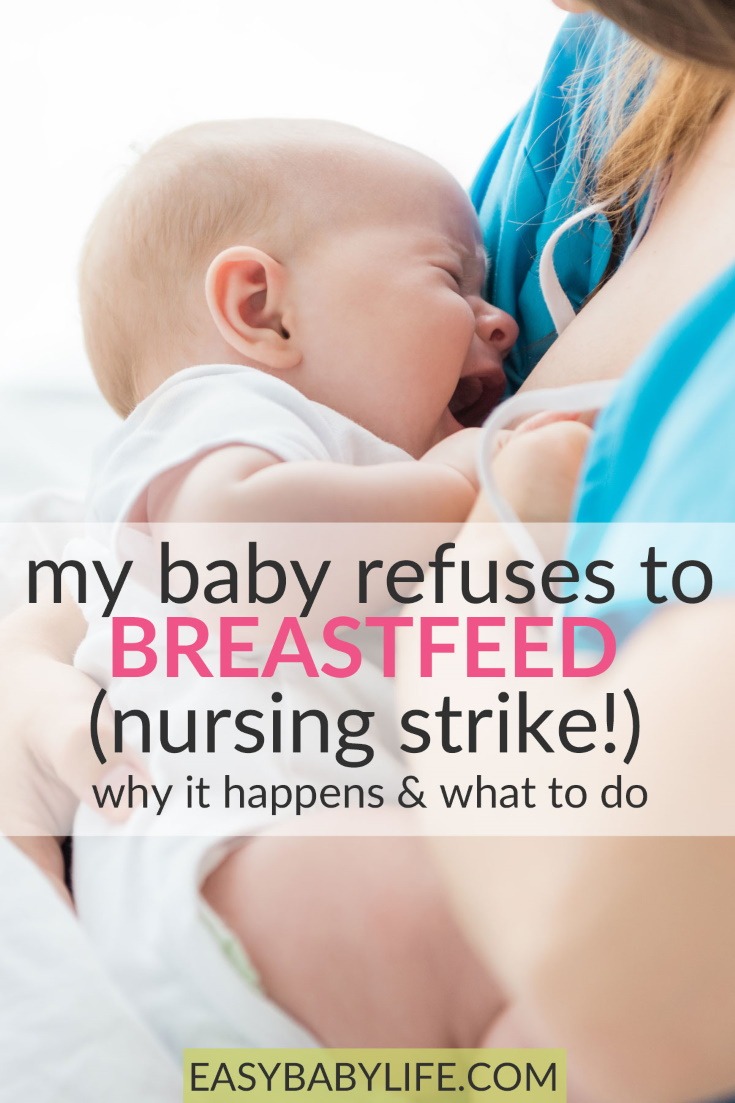The other important thing is to protect your supply. Many factors can trigger a breast-feeding strike a babys sudden refusal to breast-feed for a period of time after breast-feeding well for months.

Nursing Strike Causes Remedies And Prevention
By doing so you stimulate the production of the required amount of milk.

1 month old baby nursing strike. Bring hands to face. It signals that something is different-though not necessarily wrong-and has caught your babys attention. Babies are notorious for fooling their moms into thinking they are weaning.
It is possible that a baby younger than one year will wean himself but it is very unlikely unless he is at least nine months old. Let your baby eat when and as much as he wants. Its been two days he refused the one after diner and before bedtime.
Breastfeed your baby at least 10 times a day. Respond to a loud noise in some way. Keep Baby Hydrated.
But a breast-feeding strike doesnt necessarily mean that your baby is ready to wean. A mother may have been feeling stressed because of moving house having visitors travelling or dealing with a family crisis and put off nursing and the baby senses her distraction. Your baby could be teething which can make sucking painful fighting an earache ditto or battling a cold which can make it hard for him to breathe through his nose.
He even bit me when he was fussy and tries to nurse. Here are some baby development milestones you can expect your child to hit during month 1. In fact a common reason for cessation of nursing is infants refusal to.
Some babies will be able to. The WHO says bm should be 100 of nutrition 0-6 months 50 of nutrition at 6-12 months and a third of nutrition at 12-24 months. Half of babies will be able to.
You also might try nursing lying down or while walking around. Perhaps Mom yelled because the baby bit down perhaps a toddler spilled an ice-cold drink on the baby while she was nursing perhaps a stuffy nose or sore throat made nursing unexpectedly painful. Focus on a face.
Most babies will be able to. Recognize that shes probably not going to root and ask for it even though I know the rejection is painful. Having said that your baby will go through growth spurts from time to time.
Here are some reasons your baby may go on a nursing strike. More on that in a second. Like hellymelly I found my supply increased pretty quickly after the strike although DS did have a couple of days of loooooong feeds to get it going again.
Rejection of the breast also called a nursing strike can happen unexpectedly for a number of reasons. Lift head briefly during supervised tummy time. I went through.
Reflux is less common among breastfed babies but it. Most 1-month-old babies feed every 2 to 3 hours but watch for cues from your infant and feed more frequently if needed while he is recovering from a cold -- especially if he has a fever. Breast-feeding strikes are often short-lived.
During this period your body is trying to adjust supply to the demand. Mouth pain from teething a cold sore or an infection such as thrush An ear infection which may cause pressure or pain while nursing. Breastfeeding in 1-the month of a babys life must necessarily be on demand.
At the upcoming health checkup your healthcare provider will look at your 1-month-old babys weight length and head circumference and plot these key measurements on baby growth charts. He was having about 6 feeds a day before he went on strike. This abrupt breast refusal usually in a baby between three and eight months old is called a nursing strike.
Wait it out babywearco-sleep do skin-to-skin offer when shes especially sleepy to combat that independent distracted streak and offer offer and offer some more. Nursing strikes happen for many reasons. Will baby nurse while asleep or just waking up.
Congestion or an earache that makes nursing uncomfortable. First thing to remember is to feed the baby. Some causes could be.
An abrupt refusal by the infant to breastfeed is often called nursing strike. Comfort your baby and keep offering your breast. It could also be a growth spurt or it could be your supply.
Known as a nursing strike periods during which babies stop breastfeeding for several days can be caused by any number of factors all temporary and surmountable. Reduced milk supply or a slow letdown. If it were her ears she probably would also fuss if you just laid her down without nursing.
When babies abruptly stop nursing its a nursing strike not weaning. Babies rarely wean on their own before 18-24 months and self-weaning is almost never abrupt. My 9 month old is on a nursing strike he went from 6 good feedings to like 2 and one for a couple minutes.
A baby who is weaning himself will usually do it gradually and will not be unhappy about it. Before long your baby will start nursing again. A cold or stuffy nose which can make breathing difficult while nursing.
Sometimes the cause remains a mystery but often mothers can trace it back to something upsetting during a feeding. If its nothing physical then it could be that youve gone back to work. For example babies that have Gastroesophageal Reflux might have the symptoms you describe crying while nursing and spitting up especially if combined with poor weight gain.
I pumped to maintain supply but not sure what to do. Beginning at around three to five months or later some babies abruptly refuse to nurse. Most nursing strikes are over with the baby back to breastfeeding within two to four days.
Whether your baby is nourished by breast milk or infant formula feed him regularly to prevent dehydration. Has anyone experience this. Babies can enter a nursing strike for a variety of reasons that are both physical and emotional.
Nursing strikes usually only last a few days but. Typically the baby is trying to tell you that something isnt quite right. So if your baby suddenly seems reluctant to breastfeed it might be whats referred to as a nursing strike.
Nursing strikes can be frightening and upsetting to both you and your baby but they are almost always temporary. This is usually one of the best times to try. What matters is that your baby grows at a steady rate.
A common cause of a sudden nursing strike is the baby being startled in some way while nursing perhaps by a loud noise or by a mother involuntarily exclaiming when the baby bites. Dont take it personally.

Breastfeeding Problems And How To Fix Them

My Baby Refuses To Breastfeed Why What To Do Nursing Strike

Is It A Nursing Strike How To Tell And How To Deal

Is Baby On A Nursing Strike Or Self Weaning

Ending Baby S Nursing Strike Karing For Postpartum